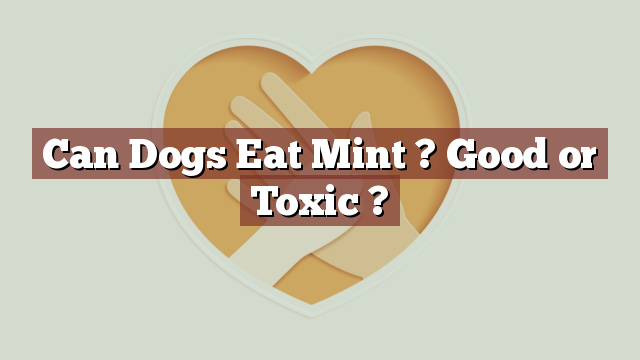Can Dogs Eat Mint? Good or Toxic?
When it comes to our furry friends, it is crucial to be aware of what foods are safe for them to consume. The well-being and health of our dogs depend on us providing them with a balanced and nutritious diet. One common question that arises is whether dogs can eat mint. In this article, we will explore the nutritional value of mint for dogs, discuss its safety and toxicity concerns, delve into the potential risks and benefits, and provide steps to take if your dog accidentally consumes mint.
Nutritional Value of Mint: What Does It Offer For Dogs?
Mint is a popular herb known for its refreshing aroma and flavor. It is commonly used in culinary dishes and even toothpaste. From a nutritional perspective, mint contains several beneficial components. It is rich in vitamins A and C, as well as minerals such as calcium and iron. Additionally, it contains antioxidants that help combat free radicals in the body. These nutrients can contribute to a dog’s overall health and well-being.
Can Dogs Eat Mint? Exploring Safety and Toxicity Concerns
The question of whether dogs can eat mint is a valid one. While mint itself is not considered toxic to dogs, it is important to exercise caution and moderation when offering it to them. Some dogs may have sensitivities or allergies to mint, resulting in digestive issues or allergic reactions. It is always best to introduce new foods gradually, in small quantities, and monitor your dog’s response. If you notice any adverse reactions, such as vomiting or diarrhea, it is recommended to discontinue feeding mint to your dog.
Potential Risks and Benefits of Dogs Consuming Mint
While mint is generally safe for dogs to consume in moderation, there are a few potential risks associated with its consumption. The essential oils found in mint, such as menthol, can cause gastrointestinal upset in some dogs. Additionally, too much mint can lead to an upset stomach or even liver damage. It is crucial to remember that dogs have different metabolic systems than humans, and what may be safe for us may not be safe for them.
On the other hand, if given in appropriate amounts, mint can offer some benefits to dogs. Its fresh and cooling properties can aid in freshening their breath and soothing upset stomachs. However, it is essential to consult with your veterinarian before incorporating mint into your dog’s diet to ensure it is suitable for their specific health needs.
My Dog Ate Mint, Now What? Steps to Take if Your Dog Eats It
If your dog accidentally consumes mint, there are a few steps you can take to ensure their well-being. Firstly, observe your dog for any signs of discomfort or distress. If your dog shows any symptoms such as vomiting, diarrhea, or difficulty breathing, contact your veterinarian immediately. It is also crucial to note the quantity of mint consumed and inform your vet.
Conclusion: Moderation and Care Is Key When Feeding Mint to Dogs
In conclusion, dogs can eat mint in moderation. While mint is generally safe for dogs, it is essential to be mindful of their individual sensitivities and potential health risks. Always introduce new foods gradually and monitor their reactions. If you have any concerns or questions about feeding mint to your dog, it is best to consult with your veterinarian for professional advice tailored to your dog’s specific needs. Remember, moderation and care are key when it comes to incorporating mint into your dog’s diet.
Thank you for investing your time in exploring [page_title] on Can-Eat.org. Our goal is to provide readers like you with thorough and reliable information about various dietary topics. Each article, including [page_title], stems from diligent research and a passion for understanding the nuances of our food choices. We believe that knowledge is a vital step towards making informed and healthy decisions. However, while "[page_title]" sheds light on its specific topic, it's crucial to remember that everyone's body reacts differently to foods and dietary changes. What might be beneficial for one person could have different effects on another. Before you consider integrating suggestions or insights from "[page_title]" into your diet, it's always wise to consult with a nutritionist or healthcare professional. Their specialized knowledge ensures that you're making choices best suited to your individual health needs. As you navigate [page_title], be mindful of potential allergies, intolerances, or unique dietary requirements you may have. No singular article can capture the vast diversity of human health, and individualized guidance is invaluable. The content provided in [page_title] serves as a general guide. It is not, by any means, a substitute for personalized medical or nutritional advice. Your health should always be the top priority, and professional guidance is the best path forward. In your journey towards a balanced and nutritious lifestyle, we hope that [page_title] serves as a helpful stepping stone. Remember, informed decisions lead to healthier outcomes. Thank you for trusting Can-Eat.org. Continue exploring, learning, and prioritizing your health. Cheers to a well-informed and healthier future!

